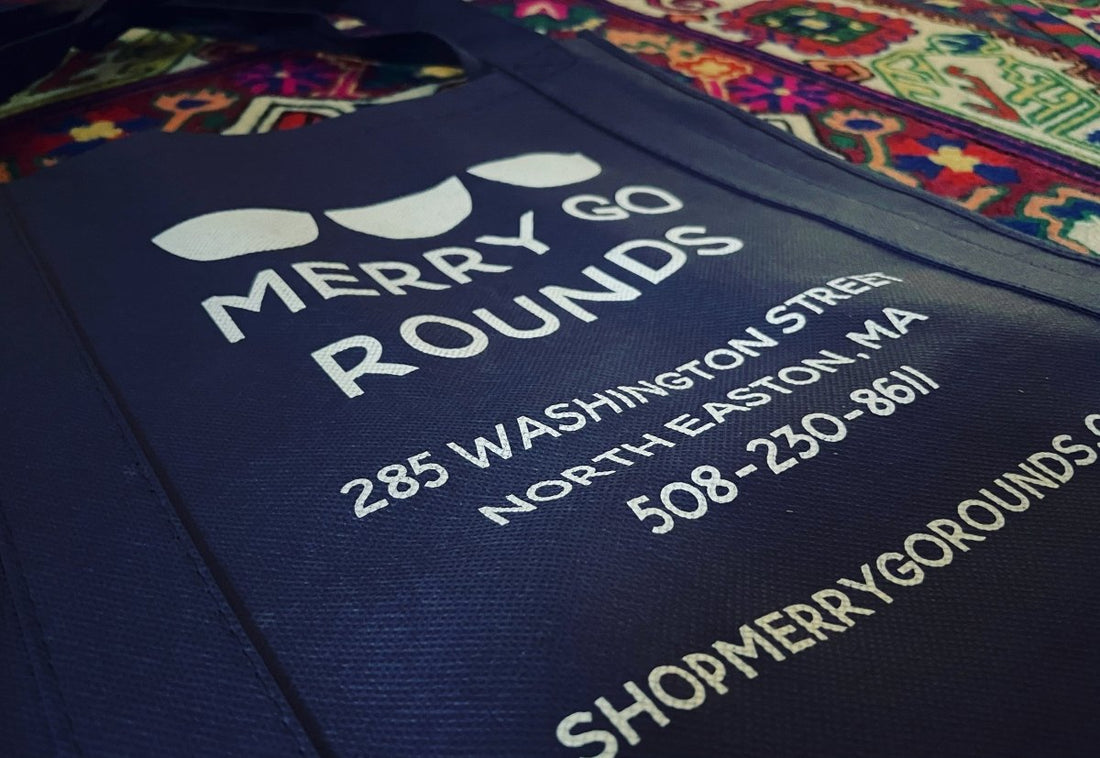On January 1, we officially stopped offering recyclable plastic bags to customers at our store. This decision was a long time coming (some may say overdue), and a lot of factors went into it. As most small business owners know, part of the job is to learn more about topics than you ever expected you'd need to know. And thus it happened that I became a bag expert.
First of all, I should note that the Town of Easton formally banned single-use plastic bags in 2019, a decision that we, as a sustainability-focused business, applauded. Single-use plastic bans (bags, straws, water bottles, etc.) are a powerful way for communities to take control of their environmental impact. In addition to the direct impact of reducing plastic use and subsequent waste, these policies nudge people to change their behavior and become more conscious about their personal ecological footprints.
However, they can also lead to backlash or unintended consequences. People don't like having to change, especially if it's inconvenient. And they don't like being called out on their personal choices when the onus of environmental action should lie with the real culprits: massive corporations churning out cheaply-made products, the fossil fuel industry, the overarching forces of consumerism and capitalism, and so on. Moreover, many of these well-intentioned changes unintentionally harm certain groups. Remember the pushback on plastic straw bans from disability rights activists? Many people with mobility or strength issues physically require straws, and banning straws outright puts those people at a major disadvantage. Of course, this was never the intent of straw bans. But it was an excellent illustration of unintended consequences and the need to take intersectional, collaborative approaches to challenges, soliciting input from a diverse range of people.
In the case of plastic bags, as far as I know, there is not an issue of physical necessity. However, there are more considerations behind their use than I had initially realized.
First of all, as you'll likely remember, many bag bans were (at least temporarily) reversed in the early days of COVID for hygiene purposes. We didn't know exactly how it spread, so accepting customers' reusable bags in stores seemed like it could be an issue. It turned out not to be, but in those days it was better to be safe than sorry. This was one of the reasons why we didn't immediately comply with Easton's ban -- it went into effect in January 2020, with a grace period for stores to make the transition. The pandemic began during that grace period, so many businesses (us included) delayed their rollout.
Second, there's the question of convenience. Many of our customers are busy parents who are doing all they can to wrangle children, snacks, toys, and numerous other things during trips out of the house. A reusable bag may or may not make it into the mix for that day's outing. The last thing we want to do is "punish" someone who didn't bring a bag into our store, either by charging a punitive fee for a paper bag or by giving them no other option but to carry their purchases by hand. We don't see any value in adding an inconvenience to anyone's day.
And finally, there's the question of price. Reusable options are costly, much more so than single-use plastics, at least for now. That's a whole other issue that we won't get into now -- why exactly is plastic, which is made from a rapidly depleting nonrenewable resource (oil), so cheap as a raw material? Shouldn't we be conserving it however we can, including by increasing its cost? A couple of years ago, we switched from "regular" colored plastic bags to recycled plastic bags, which cost more, but made us feel slightly better about using plastic. (It's also problematic that the recycled option is more expensive than the virgin one, but that is beyond the scope of this blog post.)
When we made the decision to fully move away from plastic, we looked at a number of options. In 2020 we had printed a small batch of reusable cloth totes, which we loved, but they cost us over $8 each. We sold them to our customers at cost, rather than trying to make a profit, but even that was pricey. Even though they looked great and would likely be the most sustainable option, materials-wise, for our next round of reusable bags, we realized we needed something more affordable. On the other end of the spectrum, we could have chosen single-use paper bags, since they're not plastic and therefore not technically banned (and they're arguably better for the environment, especially if they're recycled). While we did decide to keep paper bags on hand as a backup, we agreed that offering them as our default bag went against the spirit of sustainability.
We finally settled on non-woven polypropylene tote bags, which are the same fabric-like material as the ones you get at Target or grocery stores. They're somewhat mystifyingly made by "fibres entangled together by engineering means" out of polypropylene, which is thermoplastic polymer material. That's right... thermoPLASTIC! So I suppose, technically, we didn't fully get rid of plastic bags. These are plastic bags that mimic the look of fabric and, more importantly, are reusable. In my opinion, they're still a lot better than those thick "reusable" plastic bags that can pile up just as quickly as old-school plastic bags, the only difference being that they're harder to scrunch up and store. And again, the main benefit of reusable bags is that they can be used over and over, ultimately (at least in theory) reducing the need for more bags to be produced, and gently changing people's behaviors and habits towards more sustainable ones. Which kind of sounds like a consignment store's environmental value proposition as well. :)
We took the plunge and designed some beautiful navy blue bags with our logo front and center (thank you, Roby at In the Swag -- another local woman-owned small business). If you consign with us and have been in the store in the past few months, you know these bags well. We're giving each of our consignors one, as a way for them to bring in items for us to consign and for them to (hopefully) leave with some new purchases. We've gotten nothing but positive feedback since we introduced them, and it's been great to offer this little token of appreciation and convenience. They're also available for purchase, again at cost ($2.99 each). We're not making any money when people buy them, but it helps us to recoup the cost of having them made.
Finally, we set up a makeshift "reusable bag library", inspired by something I saw at the Boomerangs thrift store in Cambridge probably 10 years ago. It's a refreshingly simple solution to the overflow of reusable bags we find ourselves with. Now, customers who didn't bring a reusable bag and opt not to purchase one of ours can simply take one from our library. It will likely have a Target logo on it instead of ours, but no one has seemed to mind so far. Depending on need, we may eventually put out a call for customers to share their surplus reusable bags with us so we can restock the library. I know lots of you have more than you know what to do with.
So, there you have it: more on the intricacies of choosing a reusable bag than you ever thought you'd read about. To our customers and consignors, thank you for participating in this small act of making our business even more sustainable!

